How to Get Started with Forex Trading in the US
How to Get Started with Forex Trading in the US
Blog Article
Top Forex Strategies for American Traders
Foreign exchange, or Forex trading, brings an incredible number of players in the United Claims every year. Its utter size and liquidity ensure it is one of the very most interesting areas globally. Nevertheless, trading forex us. requires a unique and rigid approach to regulating Forex activities. If you are looking to trade currencies or simply just want to know how legitimate frameworks form the Forex industry, understanding these regulations is crucial.

Crucial Legal Frameworks Surrounding Forex in the US
Forex regulation in the United States stands apart because of its complete risk regulates and consumer protections. Two major government bodies oversee many Forex activities:
• Product Futures Trading Commission (CFTC)
• National Futures Association (NFA)
The CFTC, created in 1974, is tasked with regulating the futures and options markets, international trade included. The NFA, as a self-regulatory business, works directly with the CFTC to enforce principles and keep equity in trading practices.
Registration and Compliance
Every Forex dealer or broker employing U.S. residents must enroll with the CFTC and NFA. These entities are also required to adhere to rigorous working criteria, including:
• Minimum web money requirements (often more than in different countries)
• Continuous audits
• Strong anti-money laundering (AML) plans
• Translucent risk disclosure
Violations can cause hefty fines or a permanent ban from the market. That regulatory framework seeks to stop fraud, protect investors, and improve market integrity.
Major Limitations on Forex Actions
Foundational defenses affect how Forex runs in the U.S.:
• Influence limits: The NFA units a optimum leverage of 50:1 for important currency couples and 20:1 for minors. This really is far below several international areas, helping defend inexperienced traders from substantial losses.
• Segregation of resources: U.S. legislation involves that client funds are held split from broker working funds. This calculate safeguards traders in case a broker becomes insolvent.
• Marketing and disclosure: Firms must obviously explain risks, costs, and trading systems to clients. Inaccurate or hostile solicitation methods face rigid penalties.
Enforcement and Penalties
U.S. agencies frequently monitor for fraudulent schemes, insider trading, and illicit industry manipulation. Statistical data from enforcement studies shows a constant structure of penalties and settlements recently, displaying continuous vigilance. That setting, while stricter than most areas of the entire world, creates a better enjoying field for retail and institutional traders alike.
What to Contemplate as a US Forex Trader
Recent developments show a continuous increase in regulatory measures, an emphasis on consumer training, and constant revisions to conformity requirements. If you intend to trade Forex in the U.S., it's essential to:
• Ensure a broker's productive registration position
• Remain updated with regulatory improvements
• Evaluation chance disclosures prior to making trades
This process decreases unforeseen failures and increases your prospects in a firmly governed but powerful marketplace. By understanding legitimate regulations, U.S. traders may confidently participate in the Forex market while remaining within the parameters of the law.
Report this page